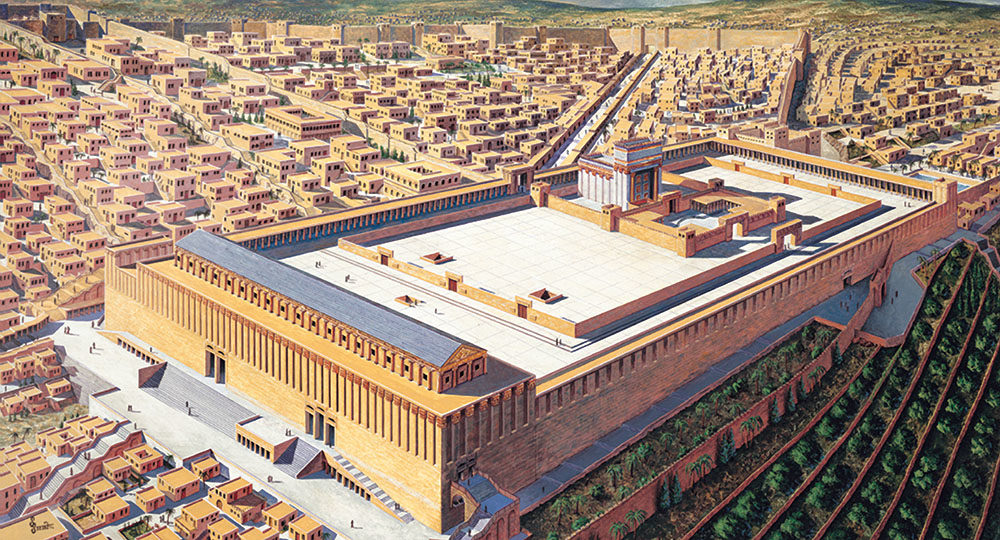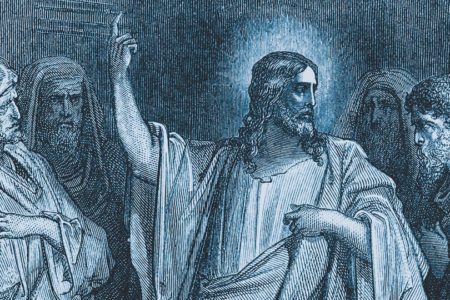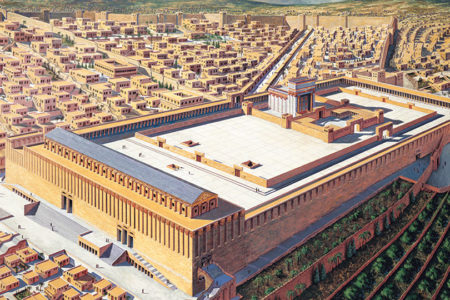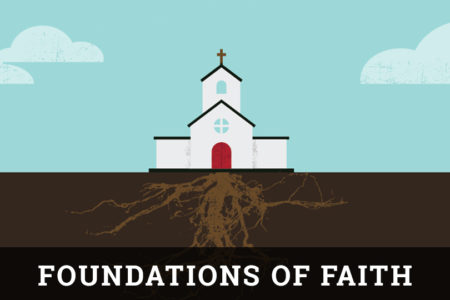The Priesthood of Believers in the New Covenant
Herod’s Temple in Jerusalem during Jesus’ day was one of the wonders of the ancient world. The beauty and grandeur of the Temple complex testified to the majesty of the God of Israel. Its intended impression on the Israelites was that God was so holy that He was virtually unapproachable. The Temple was laid out so that Gentiles, Jewish women, Jewish men, and priests could go only so far. They were never actually in the very presence of God. That privilege was reserved for the high priest, and then only once a year, on the Day of Atonement. Imagine, then, the “heresy” of the early Christians when they realized that the Messiah’s death had broken down these barriers (cp. Mt. 27:51). The implication that God did not simply dwell in a Temple made of stone led to the stoning of Stephen (Acts 7:47–50). As explained in the Book of Hebrews, Jesus, the great High Priest of the New Covenant, had made a way for believers—Jewish and Gentile—to approach God’s throne directly (Heb. 10:11–25).
The image the apostles gave us concerning this New Covenant community is of a new “spiritual temple,” in contrast to the Temple in Jerusalem. The image is that just as the Temple in Jerusalem was constructed with individual stones and indwelled by the presence of God, so God’s new Temple is being built through “living stones” and indwelled by the Spirit of God (Eph. 2:19–22). In the same way, God’s new Temple has a new priesthood consisting of all people who are in the New Covenant, as opposed to the Old Covenant, in which only Aaron’s descendants were priests. This article focuses on the position, privileges, and devotion of those in this new priesthood—the priesthood of every believer under the New Covenant.
The Priests’ Position and Privileges
The key New Testament passage to understanding New Covenant believers as priests is 1 Peter 2:4–10. Here Peter encouraged believers in Asia Minor, telling them that, while the world might misunderstand and persecute them, they were precious to God. By referring to Old Testament passages picturing Israel as God’s chosen and beloved people, Peter taught that New Covenant believers are in a similar position. He wrote:
To whom, coming as unto a living stone, disallowed indeed of men but chosen of God, and precious, Ye also, as living stones, are built up a spiritual house, an holy priesthood, to offer up spiritual sacrifices, acceptable to God by Jesus Christ…But ye are a chosen generation, a royal priesthood, an holy nation, a people of his own, that ye should show forth the praises of him who hath called you out of darkness into his marvelous light (1 Pet. 2:4–5, 9).
From this and other passages (i.e., Heb. 4:14–16; 13:15–16), we can determine four privileges of being members of this new priesthood.
Believers are Holy to God: The Old Testament meaning of holy is set apart, special. Thus, believers are special and precious to God. As Israel is God’s chosen people according to His covenant with Abraham, so New Covenant believers are special to God in Jesus Christ. Believers are to realize that just as God chose Israel from all the nations of the earth as a people to bless, so in this age God’s love in Jesus Christ is a special gift to them and shows God’s love for them.
Believers Have Direct Access to God. Because of Christ’s sacrifice of Himself and His high priestly mediation on our behalf, believers can come into the very presence of God without fear (Heb. 4:16). This is a great truth and has many implications. First, believers need not go through any other mediator, human or spiritual, to come into the presence of God. Despite our failings and weaknesses, sin and unbelief, God welcomes each of us into His presence to find grace because we are His children, covered by the blood of His Son Jesus Christ. Second, believers are all equal when approaching God. I will probably never get to meet the President of the United States because, in his eyes, I am not a VIP. But in God’s eyes, all of His children are VIPs because of His Son’s death on their behalf.
Believers are Privileged to Serve God. Just as the priests in the Old Testament had the privilege of serving God and offering sacrifices at His sanctuary, so all believers today are His special servants. A person’s earthly occupation does not matter. All believers are privileged to know God intimately and are able to do His will. Serving God is not something done out of compulsion or duty; it is the joyful expression of gratitude to God for all He has done for His children.
Believers Offer Sacrifices to God. Just as the priests in the Old Testament offered incense offerings every morning and evening to God on the altar of incense in the holy place, so believers offer the incense of praise and thanksgiving to God (Heb. 13:15). The sacrifices believers offer are not atoning, for Christ took care of that aspect. Rather, believers’ offerings worship God for who He is and what He has done on their behalf.
In summary, the primary implication of believers being a new priesthood in the New Covenant is to show their special position and privileges before God. All believers have the privilege of approaching God, serving God, and worshiping God, which demonstrates their special position before Him. The secondary implication for believers is that because they are special priests to God, their lives are devoted to Him.
The Priests’ Devotion to God
In Leviticus 1–3, three offerings are described for Israelites who wanted to bring an offering or sacrifice to God simply to demonstrate the attitude of worship or thanksgiving in their hearts for all that God had done for them. These were the burnt offering, the grain offering (accompanied by the drink offering), and the peace or fellowship offering. These offerings were not to be brought to atone for specific sins, but out of a heart of love and gratitude for God. In the same way, believer priests in the New Covenant offer sacrifices of devotion to God—not the animals or offerings of others, but of themselves. There are again four aspects of offerings of devotion that believer priests can present to God.
Offering a Living Sacrifice: In Romans 12:1, Paul exhorted the Roman believers to “present your bodies a living sacrifice, holy, acceptable unto God, which is your reasonable service.” This refers to the burnt offering in Leviticus 1, where the whole animal was burned as an offering to the Lord. The implication is that every aspect of a believer’s life is devoted to God as a response to God’s grace in Jesus Christ. As we saw above, being priests of God means that believers are owned by Him to serve Him only, and this is a great honor. Paul’s life exhibited this, for in Philippians 2:17 he again referred to the priestly offerings when he described his possible execution by Nero as a drink offering “upon the sacrifice and service of your faith.” Paul’s service and devotion for God were never a burden; they were the greatest joy of his life.
Offering Good Works: At the end of Philippians, Paul thanked the believers for their financial gift to help (presumably) with his legal expenses in Rome. He referred to their gift as “an odor of a sweet smell, a sacrifice acceptable, well-pleasing to God” (Phil. 4:18). The author to the Hebrews wrote, “But to do good and to share forget not; for with such sacrifices God is well pleased” (Heb. 13:16). Both of these situations refer to believers sharing their material goods with other believers, which is both sacrificial and pleasing to God. When considering the offerings of Leviticus 1–6, it is important to realize that those animals and the other offerings that were brought to God cost the offerers something. In the economy of that day, an unblemished bull cost a great deal, but it was to be offered wholly to God with gratitude. So today, believer priests offer back to God what He has given them—whether of their wealth or gifts—to do good for others. These are pleasing sacrifices to God.
Offering to Declare the Deeds of God: At the end of the 1 Peter passage we looked at previously, Peter referred to the intended result of God’s making believer priests and the reason for it:
But ye are a chosen generation, a royal priesthood, an holy nation, a people of his own, that ye should show forth the praises of him who hath called you out of darkness into his marvelous light; Who in time past were not a people but are now the people of God; who had not obtained mercy but now have obtained mercy (1 Pet. 2:9–10).
Using Exodus 19:6 and Hosea 2:23 as references, Peter again taught God’s grace and love for believers under the New Covenant and their proper response: They should delight in telling others what God has done for them.
My favorite aspect of Christian fellowship is when believers give testimonies about what God has done in their lives. It is, to me, most thrilling to hear, and the experience for the one telling it is both awe-inspiring and humbling. Why? Because believers should never lose the wonder of the fact that God has forgiven their sins in Jesus Christ for no other reason than that He wanted to show His love to them. It is an event that glorifies God and also witnesses to others of His wonderful grace.
Offering the Fruit of Our Spiritual Labor: When describing his ministry to the believers in Rome, Paul wrote:
Nevertheless, brethren, I have written the more boldly unto you in some sort, as putting you in mind, because of the grace that is given to me of God, That I should be the minister of Jesus Christ to the Gentiles, ministering the gospel of God, that the offering up of the Gentiles might be acceptable, being sanctified by the Holy Spirit (Rom. 15:15–16).
Here Paul directly referred to his ministry and to himself as a priest who served through the preaching of the gospel, which in turn produced fruit (i.e., Gentile converts), whom Paul then offered to God as the fruit of his spiritual labor. Few believers since then have been as gifted as Paul or have been called to do all that he was called to do. Nevertheless all believers should work hard to produce spiritual fruit that they can offer back to God. This fruit is initially internal (i.e., the fruit of the Spirit, Gal. 5:22–24), but the expression of God’s character in believers’ lives will affect those around them and produce a spiritual harvest. Often believers do not know the impact that their lives have on others. In the Kingdom, it will be a great joy to realize that our labor for the Lord was not in vain but produced spiritual fruit.
In summary, the priesthood of believers under the New Covenant is one of the great truths of the believers’ present relationship with God. It demonstrates foremost the special position and privileges believers have before God. They are His choice servants, beloved and special to Him. Being priests of God means that believers serve Him in praise and worship and offer themselves and all that God has given them to His service. Both of these acts honor God for His grace to believers and are a testimony and witness to others, so that they too may experience God’s goodness for themselves.








Am impressed with the teaching.
Why are priest not ordained in the new testament church but today we ordained pastor. Are we wrong in ordaining pastor?
I will like to get more clarification on this issues